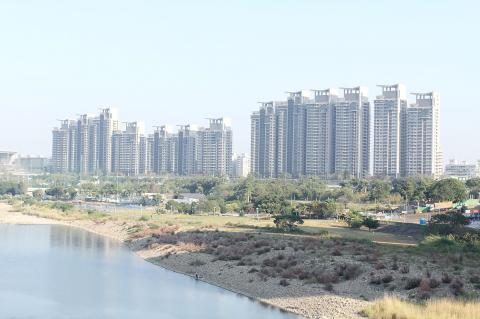An investigation should be launched into the appraisal process of all MRT joint development projects, members of Taipei City Government’s Clean Government Committee said yesterday as they announced the preliminary results of an investigation into the MeHAS City (美河市) and Syntrend Creative Park (三創園區) development projects.
Clean Government Committee member Hsu Chin-huang (徐嶔煌) said that the committee’s investigation had revealed why city-owned land had been undervalued in the appraisal process used to divide profits for the MeHAS City joint development project.
The city is in mediation with the site’s developer, Radium Life Tech Co (日勝生), seeking NT$7.6 billion (US$242 million) in compensation over alleged appraisal fraud.

Photo: Weng Yu-huang, Taipei Times
Hsu said that city land was undervalued because of illegal appraisal rules determined by the Department of Rapid Transportation Systems (DORTS), on whose land the project was constructed.
In estimating future land value, the department simply added bank interest to the appraised value of the land when project construction began, failing to take into account rapidly increasing real-estate prices, he said.
Because similar methodology was widely used by DORTS, a broader investigation into all other DORTS joint development projects should be undertaken, he said.
Committee member Wang Hsiao-yu (王小玉) called for the mediation process to be halted and project land returned to the site’s original owners, adding that she spoke only for herself because the committee’s final recommendations conclusions are still under discussion.
She also said the committee’s investigation had revealed that the main responsibility for the debacle lay with DORTS rather than former Taipei mayor Hau Lung-bin (郝龍斌).
In response to the committee’s findings, Taipei City Councilor Kao Chia-yu (高嘉瑜) of the Democratic Progressive Party (DPP) repeated demands that the city government make public all documents on the division of profits for DORTS joint development projects.
She said the MeHAS case demonstrated that the department could easily abuse its discretion in such cases, adding that making the negotiation process transparent would help the city in its bargaining by subjecting contracting firms to the pressure of public opinion.
DORTS joint development division head Li Cheng-an (李政安) said that while the department’s past actions were legal, it would seek to move the date used for appraisal of land value as close as possible to the completion of construction to ensure profit-sharing more closely reflected market changes, adding that the department had also made its appraisal process more rigorous.
He added that releasing documents relating to ongoing profit-sharing negotiations would be unwise because it could weaken the city’s position if litigation ensued.
Meanwhile, Syntrend Creative Park subcommittee convener Ma Yi-kung (馬以工) said the commission’s probe had found the project to be ridden with procedural problems.
She said the site’s zoning was problematic, at it was registered as a “parking garage” in a technology district and that its “add-on” technology complex was far larger than the “main” parking garage used for official registration.

A Ministry of Foreign Affairs official yesterday said that a delegation that visited China for an APEC meeting did not receive any kind of treatment that downgraded Taiwan’s sovereignty. Department of International Organizations Director-General Jonathan Sun (孫儉元) said that he and a group of ministry officials visited Shenzhen, China, to attend the APEC Informal Senior Officials’ Meeting last month. The trip went “smoothly and safely” for all Taiwanese delegates, as the Chinese side arranged the trip in accordance with long-standing practices, Sun said at the ministry’s weekly briefing. The Taiwanese group did not encounter any political suppression, he said. Sun made the remarks when

PREPAREDNESS: Given the difficulty of importing ammunition during wartime, the Ministry of National Defense said it would prioritize ‘coproduction’ partnerships A newly formed unit of the Marine Corps tasked with land-based security operations has recently replaced its aging, domestically produced rifles with more advanced, US-made M4A1 rifles, a source said yesterday. The unnamed source familiar with the matter said the First Security Battalion of the Marine Corps’ Air Defense and Base Guard Group has replaced its older T65K2 rifles, which have been in service since the late 1980s, with the newly received M4A1s. The source did not say exactly when the upgrade took place or how many M4A1s were issued to the battalion. The confirmation came after Chinese-language media reported

The Taiwanese passport ranked 33rd in a global listing of passports by convenience this month, rising three places from last month’s ranking, but matching its position in January last year. The Henley Passport Index, an international ranking of passports by the number of designations its holder can travel to without a visa, showed that the Taiwan passport enables holders to travel to 139 countries and territories without a visa. Singapore’s passport was ranked the most powerful with visa-free access to 192 destinations out of 227, according to the index published on Tuesday by UK-based migration investment consultancy firm Henley and Partners. Japan’s and

BROAD AGREEMENT: The two are nearing a trade deal to reduce Taiwan’s tariff to 15% and a commitment for TSMC to build five more fabs, a ‘New York Times’ report said Taiwan and the US have reached a broad consensus on a trade deal, the Executive Yuan’s Office of Trade Negotiations said yesterday, after a report said that Washington is set to reduce Taiwan’s tariff rate to 15 percent. The New York Times on Monday reported that the two nations are nearing a trade deal to reduce Taiwan’s tariff rate to 15 percent and commit Taiwan Semiconductor Manufacturing Co (TSMC, 台積電) to building at least five more facilities in the US. “The agreement, which has been under negotiation for months, is being legally scrubbed and could be announced this month,” the paper said,